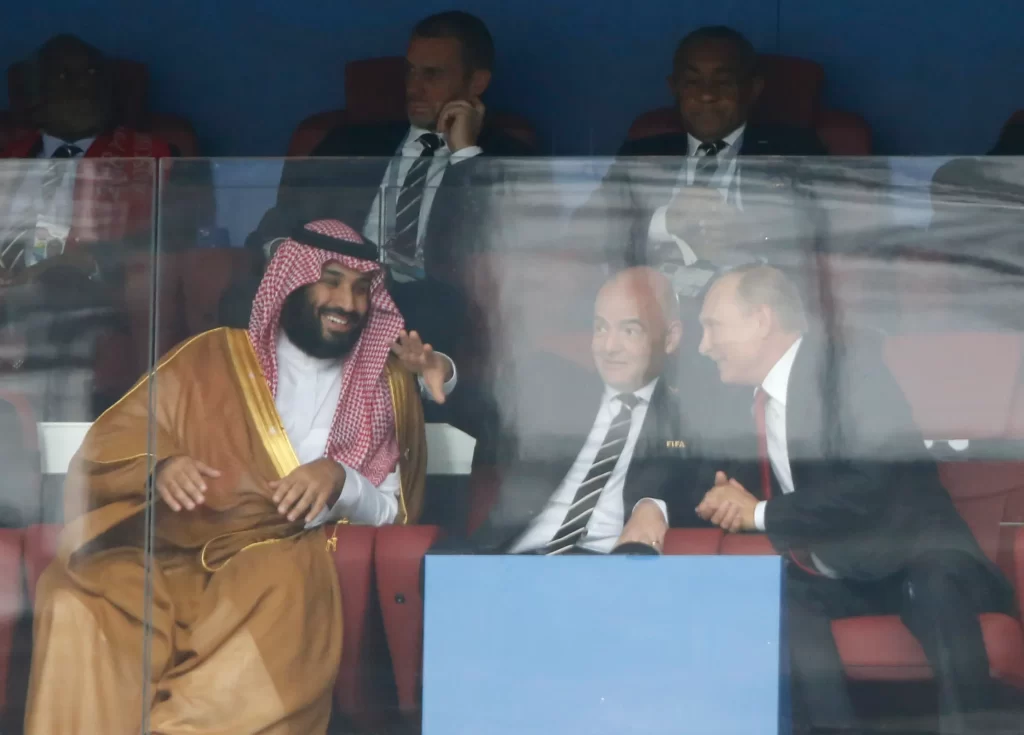
If Saudi Arabia could have designed a process for choosing future World Cup hosts, it might look similar to what FIFA unveiled this week for the 2030 and 2034 men’s soccer tournaments.
The Saudi Arabian soccer federation became the favored — and possibly only — candidate to host the biggest event in the world’s favorite sport in 2034.
A key decision that fell Saudi Arabia’s way came on Wednesday when FIFA united Europe, Africa and South America around a sole bid for 2030 in an unprecedented co-hosting team of Spain, Portugal, Morocco, Argentina, Paraguay and inaugural 1930 World Cup host Uruguay.
Those continents are now removed from the 2034 picture, even though the three South American countries accepted just one game each. That also let FIFA president Gianni Infantino deliver another surprise by fast-tracking the hosting contest to open immediately.
Only FIFA member federations from Asia and Oceania will be able to apply for hosting in 2034 — a tournament with 48 teams playing 104 games over nearly six weeks.
Focus also turned to Australia, maybe in a potential reunion with 2023 Women’s World Cup co-host New Zealand.
FIFA gave potential bidders until the end of the month to express interest and a Nov. 30 deadline to submit “completed bidding agreements.” That gives potential bidders only eight weeks to provide documents typically needing approval by the federal government. A state-backed bid in the Saudi political system faces fewer challenges than in a democracy like Australia.
Then there is FIFA’s demand for stadiums of at least 40,000-seating capacity to host the now-enlarged men’s tournament. Qatar needed only eight stadiums for the 32-team, 64-game World Cup last year.
“As part of their bid, the member association(s) must propose a minimum of 14 suitable stadiums, of which at least seven must be existing stadiums,” FIFA said Wednesday in the “Overview of the Bidding Process” document.
Saudi Arabia already meets the FIFA target with at least seven already built or under construction stadiums ahead of hosting the 2027 Asian Cup.
In Australia, some have already started questioning whether the country has seven soccer stadiums ready to go. Smaller venues were accepted for the Women’s World Cup.
The circular Melbourne Cricket Ground, which also stages Aussie Rules football, was the centerpiece of Australia’s ill-fated bid 13 years ago for the 2022 World Cup. However, it is not so popular with soccer fans.
So is Australia in for a multi-billion dollar hosting project that is short on advance notice and long on FIFA demands?
“As stated previously, Football Australia is exploring the possibility of bidding for the 2029 FIFA Club World Cup and/or the FIFA World Cup 2034,” Australian soccer federation CEO James Johnson said in a statement Thursday.
Those comments could be interpreted as leverage in a play to get a decent compensation prize from FIFA in the form of the 32-team club tournament — a prestige event that must be played in June-July 2029 to fit Europe’s soccer calendar and so is unsuited to the extreme summer heat in Saudi Arabia.
A World Cup in Saudi Arabia in 2034 would likely be played in November-December, as it was in Qatar, and FIFA has prepared for that.
“The timing of the competition is a matter that is formally approved after the appointment of the host member association,” the governing body stated in bidding documents.
Johnson, a former senior executive at FIFA and Manchester City, also is a lawyer who will have noted the rapid reaction Wednesday coming from the Asian Football Confederation. The 47-nation AFC has included Australia for nearly two decades after it moved from Oceania to seek a higher level of competition for its teams. Australia and Saudi Arabia are, in fact, teammates in the Asian soccer governing body.
“The entire Asian football family will stand united in support of the Kingdom of Saudi Arabia’s momentous initiative,” said AFC president Sheikh Salman bin Ebrahim Al Khalifa, who is a member of the royal family of Bahrain. It is an ally of Saudi Arabia.
Infantino’s closeness to Saudi Arabia and Crown Prince Mohammed bin Salman on frequent visits to the oil-rich kingdom has been clear since before the 2018 World Cup. Back then, Infantino was pushing Qatar to share hosting of a 48-team World Cup with its regional neighbors despite the country being subject to a Saudi-led diplomatic and economic boycott. That plan was resisted.
The longer term goal has been awarding Saudi Arabia its own World Cup.




